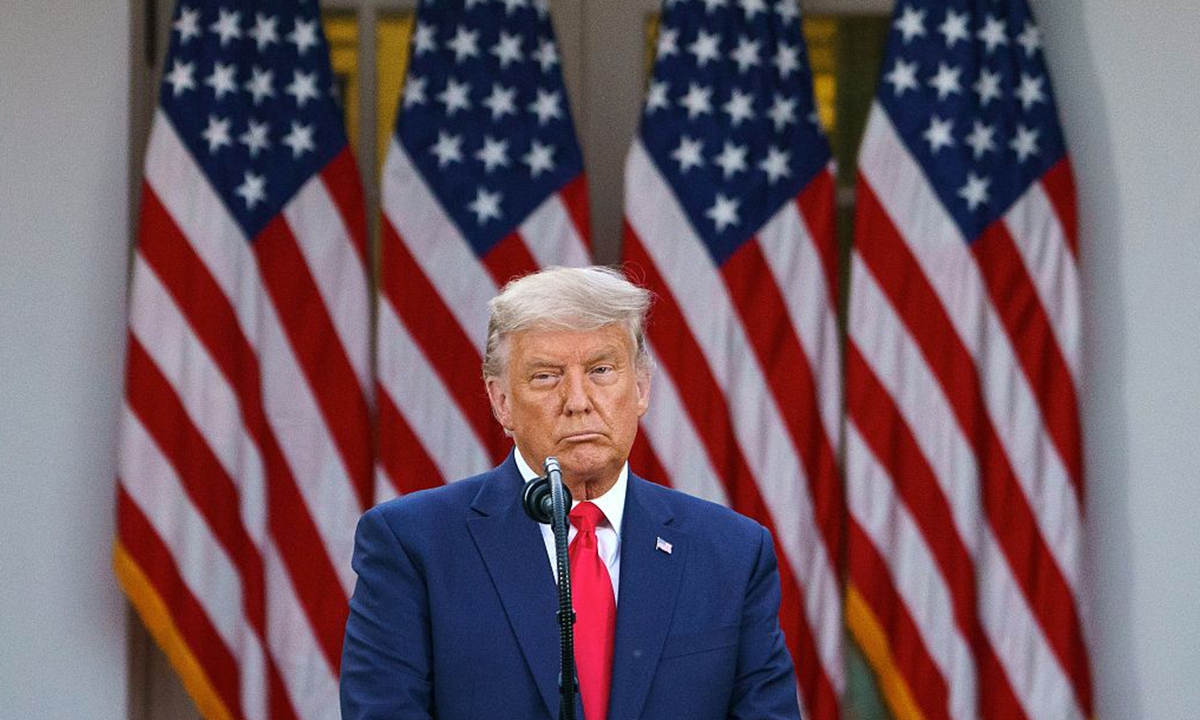US companies eager to turn a new page as they push for power transition to Biden administration
Source: Global Times Published: 2020/11/24 14:48:40

Trump Photo:VCG
US multinationals are trying to "kick away a stumbling block", the Trump administration's protectionism and anti-globalism, to push forward their global plans, in particular their exploration of the Chinese market following news that New York business leaders have signed a letter urging the Trump administration to start power transition to the incoming Biden administration.
More than 160 top US executives have signed a letter pressing the Trump administration to acknowledge Joe Biden as the president-elect and begin the transition to the new administration, according to a report by The New York Times. Most of the executives come from US multinationals including Mastercard, Visa, Condé Nast and American International Group.
Notably, many top executives from US financial companies have signed the letter, including David Solomon, chief executive of Goldman Sachs and Jon Gray, Blackstone's president, the report noted.
According to a CNBC report, General Services Administration chief Emily Murphy on Monday confirmed that the Trump administration is making federal resources available for Biden's transition into office, meaning that the US government has officially begun its transition, after weeks of legal challenges to the election results.
Although it's unclear what role the business leaders' letter played in Trump's decision to yield, heavyweight US companies have clearly been hankering to get rid of the Trump-initiated policies that have hurt their interests tremendously, said Dong Dengxin, director of the Finance and Securities Institute at Wuhan University of Science and Technology.
"In fact, the biggest beneficiaries of globalization are those US multinationals that have pushed costs down by creating manufacturing bases outside of the US and earning profits by entering huge and growing markets like China," added Dong. "Trump's action, including setting trading and investment barriers, is actually eating into their profits."
Many of the companies that urged Trump to begin the transfer of power either have mature businesses in China, or are nurturing plans to benefit from the giant market. It is unlikely any of them want their business to be ruined by the Trump administration's protectionism.
This is particularly the case in finance, where China has already scrapped ownership limits for overseas firms in the financial sector and is gradually opening its market for overseas financial service providers.
Financial firms like Citi and BlackRock have made inroads into the Chinese market; the former acquiring a domestic fund custody license, and BlackRock getting approval to start a mutual-fund business in China, paving the way for it to become one of the first foreign investment firms to start managing money for Chinese individuals.
"Given that many US financial firms are casting covetous eyes on the Chinese market and are anxious to bank on China's financial opening-up policies, they want to brush aside policy obstructions as soon as possible," Dong noted, predicting that US capital inflow into China would increase after Biden assumes office.
He also predicted that many Chinese companies, like Huawei, should also be able to escape the current difficulties caused by Trump's protectionism policies.
"The Biden administration will redress Trump's policies extensively, and though he will still see China as an economic competitor, Biden is unlikely to use hardcore sanctioning to crack down on Chinese businesses," Dong said, adding that he anticipated the additional trade tariffs imposed by Trump will also be lifted, and US companies' business links with China will be restored.
Global Times
Posted in: ECONOMY